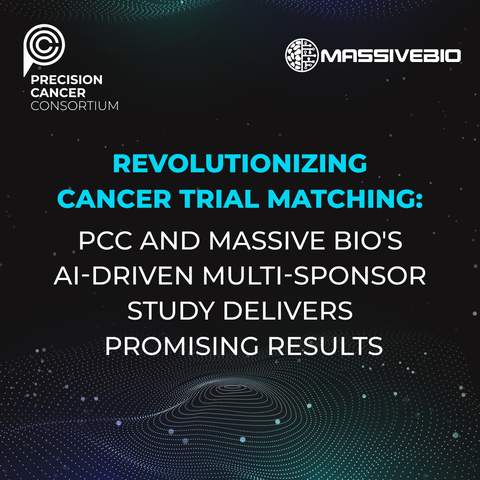ASCO Annual Meeting – The Precision Cancer Consortium (PCC), in partnership with Massive Bio, has unveiled compelling results from a comprehensive study conducted on a multi-sponsor pharmaceutical platform.
This press release features multimedia. View the full release here: https://www.businesswire.com/news/home/20240528545627/en/

PCC and Massive Bio Validate Existing AI System in Groundbreaking and Largest Multi-Sponsor Clinical Trial Matching Study (Graphic: Business Wire)
Background
Manual screening of patients for cancer trials is traditionally a resource-intensive process, taking about 25 minutes per trial and limiting patient access to suitable trials. This not only restricts available trial options but also adversely impacts enrollment rates. In response, Massive Bio and the PCC implemented an advanced multi-trial matching method that integrates Next-Generation Sequencing (NGS) results and utilizes AI to enhance both the accuracy and efficiency of trial matching, particularly for targeted therapies.
Methods
Massive Bio’s established AI system uses computer vision and natural language processing to extract 180 structured clinical parameters from medical records, and has been optimized using GPT-4 Large Language Model (LLM) and fine-tuned for the oncology and biomarker-specific use case. This system matches patients to digitized inclusion/exclusion criteria of more than 14,000 actively recruiting interventional cancer trials, using an AI-driven recommendation algorithm.
Key Findings
- Patient Data Analysis: From a dataset of 5,707 cancer patients, only 1,557 (27%) had accessible NGS testing results.
- Trial Matching Improvements: The study matched 690 unique patients to at least one trial, creating 1,254 patient-trial pairs—a 1.82-fold increase due to the multi-trial matching approach.
- Potential Increase with Full NGS: Assuming full NGS testing availability, the study projected 2,635 matching pairs, indicating a potential 2.1-fold increase.
- Targeted Therapy Case Study: In lung cancer trials focusing on the EGFR gene, matching surged to a 12.4-fold increase for unique patients.
- Matching Efficiency: The system matched or exceeded theoretical rates in 80% of trials, significantly reducing manual effort with an estimated savings of 19,500 hours (nearly 100% efficiency).
Conclusion
The fusion of NGS and AI in a multi-trial matching framework has not only nearly doubled the potential eligibility for patients across various tumor types but also achieved a twelve-fold increase in matching efficiency for specific tumor profiles, significantly curtailing manual labor.
Future Directions
Further nationwide analysis is under consideration to expand upon these promising results.
Reference:
Kurnaz S, Loaiza-Bonilla A, Carvallo Castaneda D, Huner O. Effect of a novel artificial intelligence (AI) –enabled multi-trial matching system on patient matching using real-world data. J Clin Oncol 42, 2024 (suppl 16; abstr e13501). 2024 ASCO Annual Meeting.
About the Precision Cancer Consortium (PCC)
The Precision Cancer Consortium comprises pharmaceutical and biotechnology companies dedicated to advancing precision oncology to improve patient outcomes by increasing access to comprehensive genomic testing and addressing precision diagnostics gaps. For more information, visit Precision Cancer Consortium.
About Massive Bio
Massive Bio empowers cancer patients to find optimal treatment options, utilizing AI to improve equitable access and precision in clinical trial matching, drug matching, and drug development. The company collaborates with numerous pharmaceutical companies, CROs, and hospital networks and has a global presence with nearly 100 personnel across 12 countries. Follow @MassiveBio on social media.
View source version on businesswire.com: https://www.businesswire.com/news/home/20240528545627/en/
Contacts
Precision Cancer Consortium
Email: pccadmin@precisioncancerconsortium.com
Massive Bio
Erkan Terzi, Chief Marketing Officer
Email: pr@massivebio.com
Source: Massive Bio







